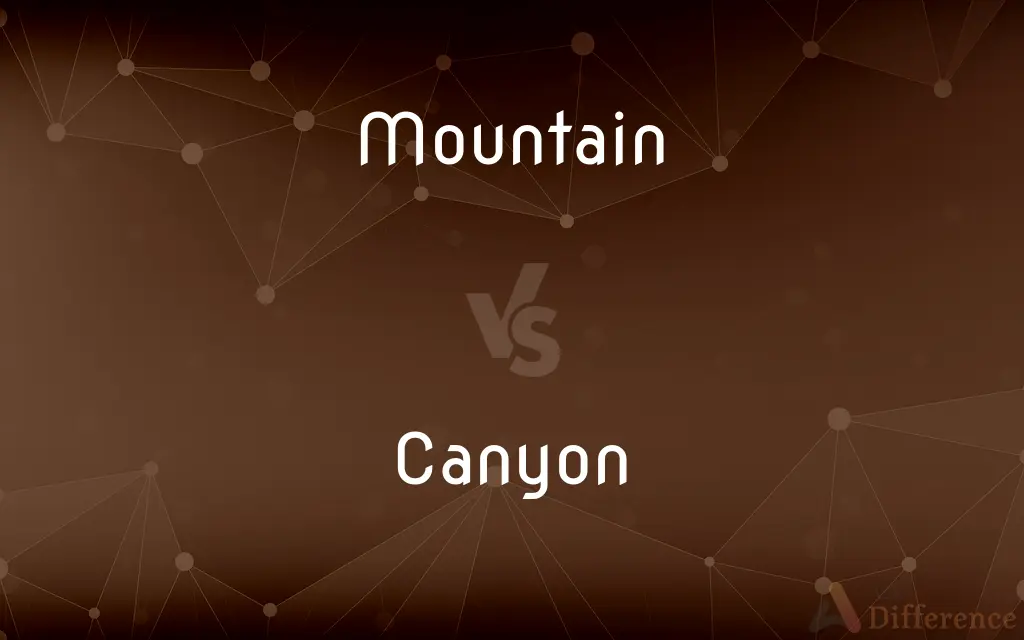Mountain vs. Canyon — What's the Difference?
By Tayyaba Rehman — Updated on October 25, 2023
Mountain is elevated landform rising prominently above surrounding land. Canyon is deep, narrow valley with steep sides.

Difference Between Mountain and Canyon
Table of Contents
ADVERTISEMENT
Key Differences
A mountain is a naturally occurring landform characterized by its elevation, often with a peak, towering above its surroundings. A canyon, on the other hand, is a deep and narrow valley, usually carved out by the forces of erosion over long periods.
Mountains can be solitary features or be part of extensive ranges. Their formation usually results from tectonic plate movements and volcanic activities. Canyons, conversely, are often shaped by water, especially rivers cutting through the rock, although other agents like wind can also play a role.
People often trek, climb, or build settlements on mountains due to their scenic beauty and strategic advantages. Canyons might offer opportunities for activities like rafting, and their unique ecosystems can host diverse flora and fauna.
The weather on a mountain can be unpredictable, with temperature changes being more prominent with altitude. Canyons, depending on their depth and orientation, can have their own microclimates – often cooler at the bottom than at the rim.
Both mountains and canyons have been symbolic in many cultures. Mountains are often seen as places of enlightenment or challenge, while canyons can represent depth, exploration, or life's journey.
ADVERTISEMENT
Comparison Chart
Definition
Elevated landform with a peak.
Deep, narrow valley with steep sides.
Formation
Tectonic movements, volcanic activities.
Erosion, primarily by water.
Activities
Trekking, climbing, settlements.
Rafting, hiking, exploration.
Weather Influences
Altitude affects temperature and weather.
Depth and orientation affect microclimates.
Symbolism
Enlightenment, challenge.
Depth, exploration, journey.
Compare with Definitions
Mountain
A significant point of reference in topography.
From the top of the mountain, the entire valley was visible.
Canyon
A ravine formed by weathering and the erosive activity of a river.
The Colorado River carved the canyon over millions of years.
Mountain
A naturally occurring barrier often forming a range.
The Rocky Mountains stretch across multiple states.
Canyon
A place of beauty and often unique ecosystems.
The depths of the canyon hosted species not found elsewhere.
Mountain
An area with high elevations characterized by steep slopes.
The mountain provided a challenge for the hikers.
Canyon
A deep gorge typically with a river flowing through it.
The Grand Canyon is a popular tourist destination.
Mountain
A symbol of obstacles or aspirations in literature.
Climbing the mountain became a metaphor for overcoming his personal challenges.
Canyon
A significant cut into the earth's surface, deeper than a valley.
The canyon's walls displayed a rich tapestry of geological history.
Mountain
A large landform rising above the surrounding land in a limited area.
The mountain's peak was covered in snow.
Canyon
A representation of nature's power to shape the landscape.
The canyon stood as a testament to the relentless force of water.
Mountain
A mountain is an elevated portion of the Earth's crust, generally with steep sides that show significant exposed bedrock. A mountain differs from a plateau in having a limited summit area, and is larger than a hill, typically rising at least 300 metres (1000 feet) above the surrounding land.
Canyon
A canyon (from Spanish: cañón; archaic British English spelling: cañon) or gorge is a deep cleft between escarpments or cliffs resulting from weathering and the erosive activity of a river over geologic time scales. Rivers have a natural tendency to cut through underlying surfaces, eventually wearing away rock layers as sediments are removed downstream.
Mountain
Abbr. Mt. or Mtn. A natural elevation of the earth's surface having considerable mass, generally steep sides, and a height greater than that of a hill.
Canyon
A deep gorge, typically one with a river flowing through it, as found in North America
The Grand Canyon
Mountain
A large heap
A mountain of laundry.
Canyon
A narrow chasm with steep cliff walls, cut into the earth by running water; a gorge.
Mountain
A huge quantity
A mountain of trouble.
Canyon
A valley, especially a long, narrow, steep valley, cut in rock by a river.
Mountain
(countable) An elevation of land of considerable dimensions rising more or less abruptly, forming a conspicuous figure in the landscape, usually having a small extent of surface at its summit.
Everest is the highest mountain in the world.
We spent the weekend hiking in the mountains.
Canyon
The English form of the Spanish word Cañon.
Mountain
(countable) Something very large in size or quantity; a huge amount; a great heap.
He was a real mountain of a man, standing seven feet tall.
There's still a mountain of work to do.
Canyon
A ravine formed by a river in an area with little rainfall
Mountain
(figuratively) A difficult task or challenge.
Mountain
Wine from Malaga made from grapes that grow on a mountain.
Mountain
A woman's large breast.
Mountain
(cartomancy) The twenty-first Lenormand card.
Mountain
A large mass of earth and rock, rising above the common level of the earth or adjacent land; earth and rock forming an isolated peak or a ridge; an eminence higher than a hill; a mount.
Mountain
A range, chain, or group of such elevations; as, the White Mountains.
Mountain
A mountainlike mass; something of great bulk; a large quantity.
I should have been a mountain of mummy.
Mountain
Of or pertaining to a mountain or mountains; growing or living on a mountain; found on or peculiar to mountains; among mountains; as, a mountain torrent; mountain pines; mountain goats; mountain air; mountain howitzer.
Mountain
Like a mountain; mountainous; vast; very great.
The high, the mountain majesty of worth.
Mountain
A land mass that projects well above its surroundings; higher than a hill
Mountain
A large number or amount;
Made lots of new friends
She amassed a mountain of newspapers
Mountain
Relating to or located in mountains;
Mountain people
Common Curiosities
How do canyons differ from valleys?
Canyons are typically deeper and narrower than valleys, with much steeper sides.
How are mountains formed?
Mountains can form through tectonic plate movements, volcanic activities, or erosion.
How are canyons formed?
Canyons are usually formed by the erosive action of rivers over long periods, though wind and glaciers can also play roles.
Are all mountains snow-capped?
No, only mountains that reach certain altitudes or are in cold regions will have snow-capped peaks.
Are canyons dangerous to explore?
While canyons can be stunning, they can pose risks like flash floods, so caution and preparation are essential.
What is a canyon?
A canyon is a deep and narrow valley with steep sides, often carved out by erosion.
Can mountains be found inside canyons?
While a mountain itself cannot be inside a canyon, mountainous regions can have canyons carved within them.
What is a mountain?
A mountain is an elevated landform, often with a peak, rising prominently above its surrounding terrain.
Do mountains affect climate?
Absolutely. Mountains can influence weather patterns, rain shadows, and temperature variations.
Which is the highest mountain in the world?
Mount Everest is the highest mountain in the world, measured from sea level.
Which is the largest canyon in the world?
The Grand Canyon is often considered the most famous, but the Yarlung Tsangpo Canyon in Tibet may be both deeper and longer.
How do animals and plants adapt to life in canyons?
Flora and fauna in canyons have adapted to unique microclimates, with some species specialized for life in shaded, moist canyon bottoms or sunlit, dry rims.
Can people live on mountains or in canyons?
Yes, many cultures have historically settled in mountainous regions for strategic or agricultural reasons, and some communities exist within or near canyons.
Are there underwater mountains and canyons?
Yes, underwater mountains are known as seamounts and oceanic trenches can be seen as underwater canyons.
Why are mountains often seen as spiritual places?
Many cultures consider mountains as closer to the heavens or divine, making them places of worship or meditation.
Share Your Discovery

Previous Comparison
Phyla vs. Phylum
Next Comparison
Wrath vs. FuryAuthor Spotlight
Written by
Tayyaba RehmanTayyaba Rehman is a distinguished writer, currently serving as a primary contributor to askdifference.com. As a researcher in semantics and etymology, Tayyaba's passion for the complexity of languages and their distinctions has found a perfect home on the platform. Tayyaba delves into the intricacies of language, distinguishing between commonly confused words and phrases, thereby providing clarity for readers worldwide.
















































